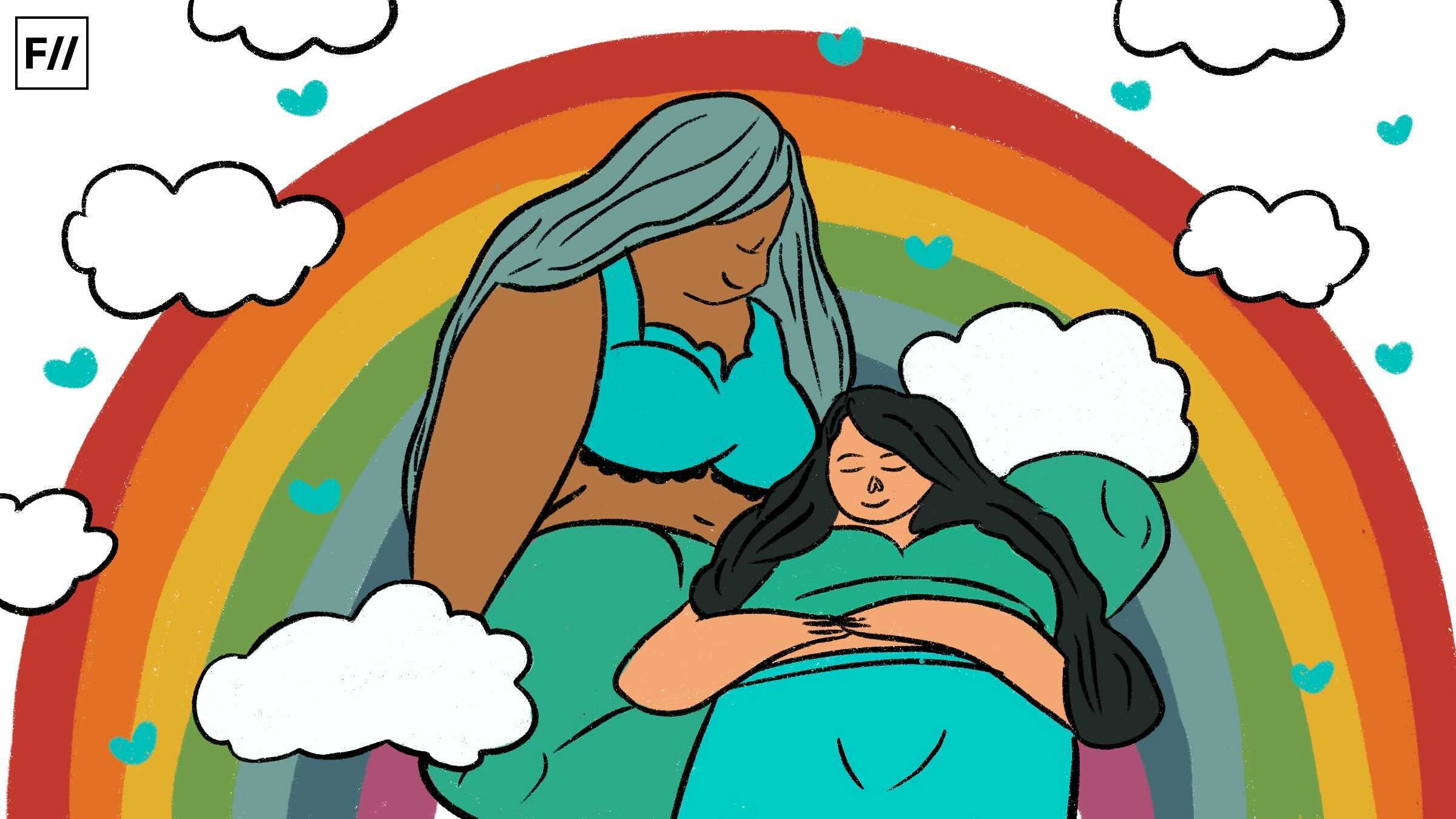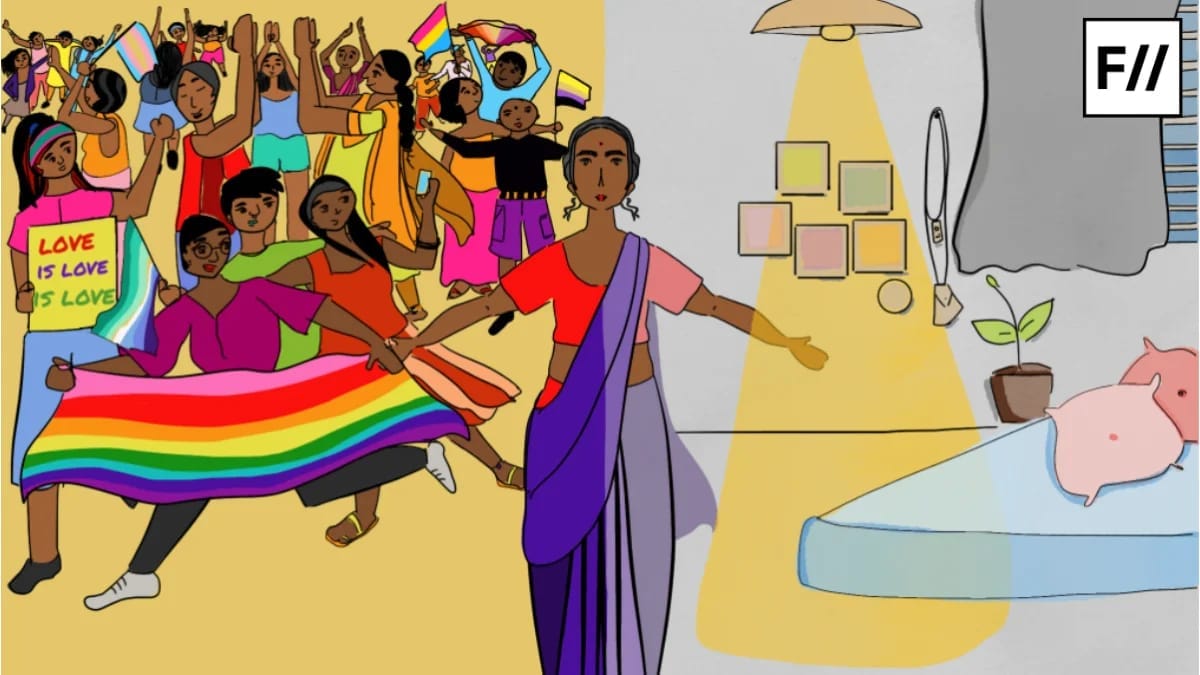gar mujhe is kā yaqīñ ho ki tire dil kī thakan
Faiz Ahmed Faiz
tirī āñkhoñ kī udāsī tere siine kī jalan
merī dil-jūī mire pyaar se miT jā.egī
I like to believe Faiz Ahmed Faiz writes about his love for his beloveds—his friends and lovers—that all he needs is to believe that his love will cure his friends of their heartaches. And I appropriate Faiz here, for the queer love I have for my friends.
I want to talk about the heteronormativity of tying sex, desire and intimacy with the concept of romance solely. Queerness has time and again been limited to merely the liberal concept of “choice” of romantic/sexual partners. When, in all its actuality, queerness is a radical, post-structural process of doing away with these restrictive institutions. Queerness is as much about anger, solidarity and friendships as it is about romantic love.
So I asked a few queer friends their ideas about queerplatonic relationships or friendships and all of them had similar answers—that these relationships are almost always immediate friendships for them, not by virtue of them having to know someone, but by virtue of belongingness in the same community, and if not friendship then a dynamic of shared anger. It becomes easier, more comfortable and oftentimes, more trusting to be friends with queer people, as against cis-het individuals.
Queerness is a radical, post-structural process of doing away with restrictive institutions. It is as much about anger, solidarity and friendships as it is about romantic love.
“You meet somebody who is queer for the first time and *snaps fingers* it’s this. You don’t have to explain your identity or life as a queer to them. Maybe not always, but it takes away the extra labour that goes into forming strong bonds,” says Oishani.
Queerplatonic relationships or friendships between queer people challenge these heteronormative ideas of how a relationship should look like, some of them being boundaries till which friends can love each other. This is to say most queer people experience friendship as a very intimate dynamic between two or more people—platonicity doesn’t become secondary to romance, as it may do in heteronormative relationships. There is no inherent hierarchy, for that matter, blood-related family doesn’t come before romantic love and romantic love doesn’t come before platonic love. Queerness, in itself allows space for fluidity and queerplatonic relationships do the same.
There is more comfort in being intimate with your queer friends. With a cis-het friend, you might be wary of them perceiving you as predatory if you’re merely expressing your love by holding hands, or lying on their laps, etc. (for a lot of people), but with a lot of queer people, these are the most basic expressions of love. And this is just a very personal opinion, a lot of people aren’t comfortable with intimacy or desire and those are their own stories to share.
I’d also like to note queerplatonic relationships are also dearly important to queers who lie on the aromantic-asexual spectrum. For me, the concept of queerplatonic relationships helped me navigate through my demisexuality because it does validate the idea (and fact) that sex is not sexual.
“Desire isn’t just reserved for romance,” says N.
Queerplatonic relationships give space to all kinds of love, love languages and emotions, a lot of which most queers don’t find in a hetero-confined space.
I asked my friends if they would kiss their friends on the mouth (platonically), given the consent of all parties involved, they all answered with a yes! This question was a mere inquiry into understanding where do queer friends draw lines when it comes to expressing love. Most believed, different kinds of love manifests differently for everyone, and being physically intimate or desiring your friends doesn’t automatically come with the burden of romance in friendships neither should it have to. Because as Sam, one of the people I talked to, says
“…that definition of friendship serves the male and sexualising gaze of the society, not us queers.”
Though monogamous people tend to have singular romantic partners, most queer ones don’t necessarily think that intimacy with other friends is romantic or threatening to their romantic relationships. Polyamorous people perceive queerplatonic relationships very similarly—we don’t call everyone that we have had intimate relationship with our partner—some of them are friends and some are lovers! Queerplatonic relationships give space to all kinds of love, love languages and emotions, a lot of which most queers don’t find in a hetero-confined space.
This isn’t to invalidate monogamous experiences of not wanting the same kind of physicality as one has in a romantic dynamic, this is merely to say, you can kiss your friends on the mouth or have sex with them if you want to, it doesn’t make your friendship more or less.
So what would qualify as cheating in a queer monogamous set up? It would merely solicit a discussion. For example, most cis-het people I know aren’t comfortable with their partners being intimate friends with their exes, because if they are, it could turn into cheating or something, and that’s such a weird concept to me because queer people are almost always friends with their exes (or somebody else’s exes, the community dating pool is very small/jk). It’s a lot more about the intention of an act with another person than it is about the conventional nature of the act.
Moreover, queerplatonic relationships become especially important for me as a neurodivergent person (and a lot of others too) because it’s exceedingly harder to navigate platonic intimacy otherwise. My love language and easiest stimming technique being tactility, I need a sense of touch to understand the feeling of love, so naturally, if I love my friends fiercely, I’d like to be more physical with them and vice-versa (given their consent). Many neurodivergent queers have trouble processing romantic relationships and the safety of knowing that not all relationships you like having have to conform to these relationship structures makes everything so much easier.
Some age-old convention of loving people from afar shouldn’t stop us from loving the way we want to, should it? (but alas, it does so many times over)
On an average day, you’ll find Mili reading out Faiz Ahmed Faiz to her cats, listening to Kishore Kumar and drinking an unhealthy amount of coffee. She likes to read and write about economics, politics and anything that’s shiny (mostly poems, paintings, pictures and p-stories). You can reach out to her at milimukim@gmail.com, you can find her portfolio here.
The author held conversations with Oishani, Sam, N, M, Hana and K for this piece and would like to thank them for their inputs.
Featured Image Credit: Shreya Tingal for Feminism in India




